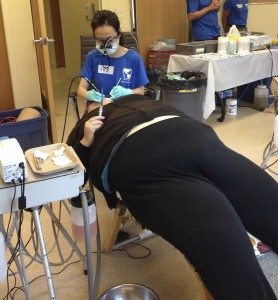Philosophy of Practice
As I ponder and attempt to define my philosophy of practice, I reflect on the values I cherish during dental hygiene practice.
As I began my journey at the UBC dental hygiene program, I was introduced to the dental hygiene scope of practice and the embodied values of this profession. Throughout years of clinical practice and client interactions, I found my passion deeply rooted in the preventative and empowering aspect of this profession.
There is an ancient Chinese saying, “you can treat the leaves or you can treat the root.”
This saying is a good demonstration of my belief in practice – the importance of holistic and preventative care.
Through past experience, I found that clients who suffer from poor oral health often have less understanding of the root causes of the diseases and are less resourceful in preventative measures. This observation inspired my philosophy to empower individuals to take control of their own health and make changes through preventative measures. Clients’ improvement in oral conditions and success in oral diseases prevention reinforced my philosophy of practice and motivated me to continue on the journey to promote holistic and preventative care.
Through the reflection of past UBC clinical practice, community work and volunteer experiences, I also learned what defines my value and philosophy in practice.
I strive to provide the highest quality care, while personalize the treatment and care uniquely to each client needs.

I am often asked the question, “what led you to the dental hygiene profession?” In spite of the pleasure to educate and care for clients, I also value the opportunity to create lasting client relationships working as a dental hygienist. To provide clients the effective and quality treatment, it is essential to learn the root causes of their diseases by understanding each client as a whole. By learning each client’s lifestyle in detail, I can learn about the socioeconomic determinants of one’s health and create a personalized treatment plan.
My strength in practice, which I learned early in my career, is the ability to pinpoint the socioeconomic determinants to health through every-day conversations with a client. Additionally, I also learned during practice the importance to acknowledge clients’ feeling of powerlessness and lack of control in their oral diseases.
To truly provide quality care, I believe, we, dental hygienists must exercise empathy by appreciating what is important to the clients, understanding their unmet needs and the role the diseases play in their lives, while embracing shared decision-making. These steps will lead to a mutually agreed upon treatment plan, which clients are comfortable with and will adhere to.
I alone cannot change the world, but I can cast a stone across the waters to create many ripples.” ― Mother Teresa
“It’s the action, not the fruit of the action, that’s important. You have to do the right thing. It may not be in your power, may not be in your time, that there’ll be any fruit. But that doesn’t mean you stop doing the right thing. You may never know what results come from your action. But if you do nothing, there will be no result.” ―Mahatma Gandhi
I conclude with these quotes because these quote shed lights to my practice when I encounter obstacles. These quotes remind me to continue trying, whether it is finding methods to help clients or doing good to the society. As a dental hygienist, I have the ability to change and impact a person’s life, perhaps from promoting the use of floss and smoking cessation to preventing oral cancer and saving ones life through early detection.

